| Article ID | Journal | Published Year | Pages | File Type |
|---|---|---|---|---|
| 5054168 | Economic Modelling | 2014 | 14 Pages |
Abstract
This paper presents an innovative approach for estimating changes in a country's food and nutrition security subject to economic growth and related income distribution over time. Specifically, we combine a dynamic computable general equilibrium model with household- and individual-level regression models and apply this macro-micro approach to assess the effects of Yemen's crisis-induced economic recession in 2011/12, together with two alternative transition scenarios from 2013 to 2020. Our results strongly suggest that not only more rapid, but also broader based economic growth will be needed for a quick return to pre-crisis food and nutrition security levels in Yemen. In addition to broader based growth that benefits the poor, targeted measures for improving nutrition such as integrated childcare programs and awareness campaigns related to family planning, female education, and qat consumption are needed.
Related Topics
Social Sciences and Humanities
Economics, Econometrics and Finance
Economics and Econometrics
Authors
Clemens Breisinger, Olivier Ecker,
